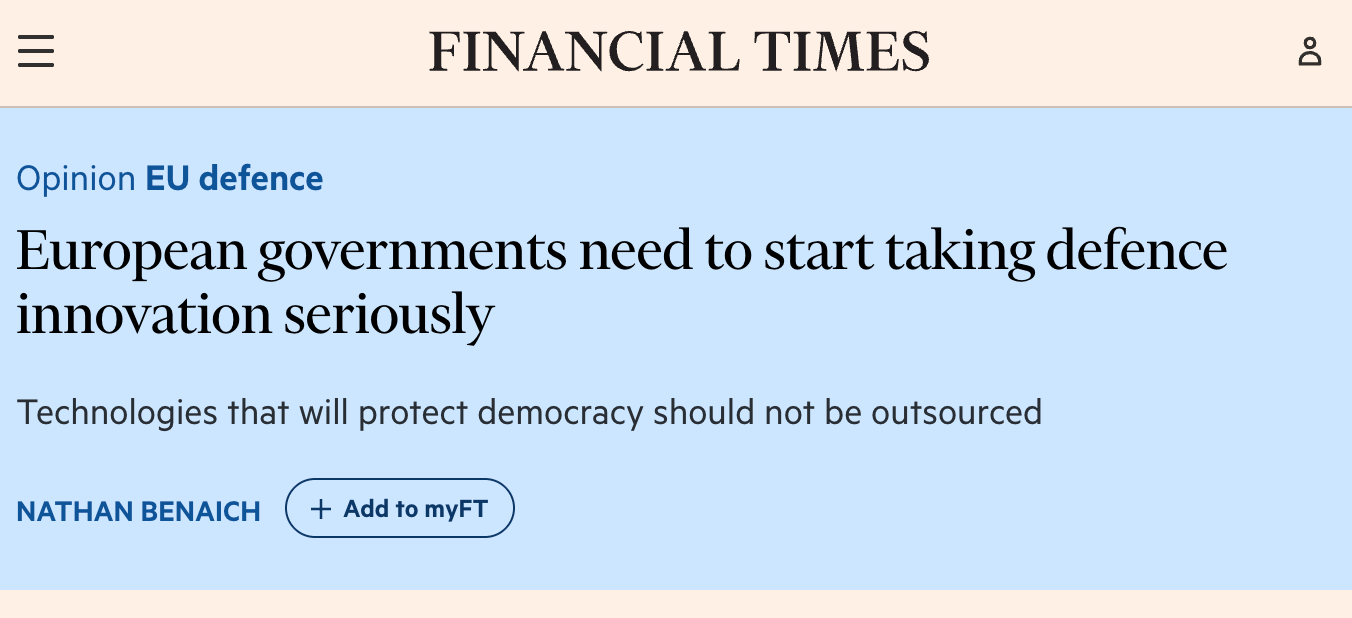Our investment in Polar Mist
Building European maritime supremacy. Bonus: launch video at the bottom!
A sea change for European defense
America’s military shield over Europe is fading. Will Europe rise to defend itself—or learn too late that no one else will?
The last few weeks of US-Europe national security policy have been nothing short of a shocking sea change for Europeans. Back in February 2025 at the Munich Security Conference, US Vice President Vance and Defense Secretary Pete Hegseth called European leaders out for not investing in their own defense capabilities and free riding on US security guarantees. Like President Trump, they called for European nations to increase defense spending to 5% of GDP and hinted at a possible reduction in American military presence in Europe.
But then came the breaking point. After a heated White House visit, President Zelenskyy left empty-handed—no minerals deal, no US security guarantees. Days later, Europe responded with its own plan: 'ReArm Europe'. The so-called White Paper for European Defence – Readiness 2030 laid out an urgent plan to overhaul Europe’s defense capabilities, aiming for full readiness by 2030.
To achieve this, the Commission wants European member states to unlock over €800B for defense by a) asking each member to increase its spending on defense by 1.5% of GDP annually and b) by raising €150B from capital markets as long-term loans backed by the EU budget to be spent on defense. Importantly, this money is to be spent on European defense companies, not US players.
Democracy won’t defend itself with the next grocery-delivery app
Air Street made its first defense investment in the summer of 2021 with US-based Modern Intelligence, building one AI for defense, with a focus on targeting. In 2023, Air Street invested in Delian Alliance Industries, building defense for autonomous warfare. The same year, I wrote an oped for the Financial Times to argue that European policy makers, industry players and investors were not taking defense seriously enough. This wasn’t a popular opinion. But times have now changed.
European venture capital is failing to go after the hardest problems. Democracy won’t defend itself with the next grocery-delivery app. While Andreessen Horowitz’s American Dynamism project may have been mocked by some in Europe, no one has been brave enough to start an equivalent drive for a “European Dynamism”.
The missing domain
While the world fixates on drones and tanks, the sea remains the greatest blind spot in modern warfare. Given that the Ukraine-Russia war is overwhelmingly fought over land with relatively minimal naval engagements, this bias makes sense.
But the real storm is at sea. Chinese warships just staged their latest show of force in the Taiwan Strait. The South China Sea is a powder keg. The Baltic Sea is a theatre for indiscriminate undersea cable cutting and gas pipeline sabotage. Europe can’t afford to ignore maritime deterrence any longer. Autonomy is just as critical at sea, yet few defense companies are stepping up to the challenge.
Investing in Polar Mist
As European leaders scramble to rebuild their defense capabilities, the most critical—and overlooked—domain is at sea. That’s why we’re backing Polar Mist—Europe’s answer to maritime autonomy.
Founded 2 years ago in Sweden by graduates of Lund University’s Engineering Physics program and the Swedish Armed Forces’ Amphibious Regiment, Polar Mist is building European maritime supremacy.
To start, the company has developed a breakthrough in maritime navigation - an optical, GPS-free positioning system that doesn’t drift over time. With traditional satellite-based systems being jammable, independent navigation is a must-have to build autonomous systems. This means surface vessels that can autonomously navigate over large distances, in all conditions, day or night, to complete a mission or reach a target of interest without satellite communication.
With this breakthrough, Polar Mist isn’t stopping at navigation. They’re building the future of unmanned maritime defense—full-stack autonomy, from on-board intelligence to fast and robust hardware platforms.
Born in Sweden, the company is starting at home—no surprise, given Sweden’s historic military shift. In 2024, it became NATO’s 32nd member, ending 200 years of neutrality since the Napoleonic Wars. Prime Minister Kristersson has recently committed to boosting defense spending to 3.5% of GDP and expanding the armed forces to 115,000 by 2030—the country’s largest military buildup since the Cold War.
Polar Mist is securing the seas so Europe can defend itself—because no one else will.





